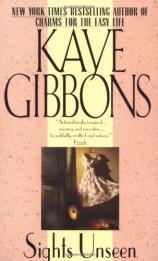Reading Group Guide
Discussion Questions
Sights Unseen

1. The title SIGHTS UNSEEN is wonderfully evocative and can be interpreted as having different meanings for each of the novel's main characters. In what ways did Maggie's illness limit her vision, and what did it cause her to miss? What sights were unseen by Hattie as a child, and how did this affect her development? What remained unseen by Hattie's father, and how did these instances of "blindness" affect his family? Which other characters experienced "sights unseen?" How did the family's hidden experiences isolate them from the community?
2. Hattie draws a brilliant comparison between some of her family members and a set of magnets (p. 154-155) to understand the simultaneous repulsion and attraction that complicated the relationships she experienced and witnessed. How does her analogy illuminate the relationship between Hattie and her mother? Freddy and Maggie? Maggie and her husband.
3. Hattie writes, "Had I known my mother was being given electro-convulsive therapy while I was dressing for school on eight consecutive Monday mornings, I do not think I could have buttoned my blouse or tied my shoes or located my homework" (p. 3). Why would a 12-year-old girl have been so overwhelmed by this information, and how do you think it would have changed the way she related to her mother upon her return from the hospital? How could this knowledge have affected Hattie's ability to cope with illness (her own, her children's, others') in her future?
4. Although the novel is written from Hattie's point of view, the author succeeds in providing a thorough and fascinating portrayal of Freddy's character. While Hattie writes that "Freddy's maturity was inchoate" (p. 162), what do we as readers know about Maggie's effect on his sexual development? His obsessive commitment to academic excellence? His emotional inaccessibility?
5. The book's presentation of Maggie's manic depression is extremely powerful. By examining the description of one of her manic episodes at Hattie's sixth birthday party (p. 84-87), discuss the techniques the author uses to achieve impact. What other narrative devices could the author have used, and why would they have been less successful?
6. Mr. Barnes is as dark and conflicted a character as any in recent fiction. Examine how his coldness and violence influence the personalities of his sons and his grandchildren. Why does he behave so differently toward Maggie, and does this special treatment help or hurt the family?
7. Hattie writes, "I wanted Maggie Barnes, the woman with all the problems, to turn into my mother" (p. 93). What expectations do many of us have of our mothers, and are they fair? Is Hattie ultimately satisfied with or disappointed in her mother once she has recovered?
8. Uncle Lawrence and Aunt Menefree are described respectively by Hattie as having "the look of a man who never gets to go anywhere" (p. 144) and the kind of woman who drives men to other women" (p. 147). What importance do they have in the novel, and how do they influence young Hattie's understanding of relationships between men and women?
9. How did Hattie's family life contribute to her becoming a girl who "knew better than to need anything" (p. 135)? Why can it be so harmful for girls to be taught to be "good" and not to demand what they want or need?
10. Young Hattie was continuously frustrated by her ability to "get through" to Maggie and influence bad behavior, and she writes, "If I had a little girl, I thought, I would look at her and discover ways to ground myself" (p. 4). How is Hattie able to maintain such strong love for Maggie even though her mother disappoints her time after time? How does Hattie's relationship with her mother affect the ways she later mothers her own children?
11. Hattie writes, "I had such a backlog of things to say to [Maggie] that picking one became an insurmountable task" (p. 156). Why do Hattie and Maggie remain strangers even after Maggie's illness is under control? How does Freddy contribute to the two women's emotional distance?
12. As Hattie reflects on her past, she wonders, "Why did I 'turn out'?" Why did my brother 'turn out'?" (p. 5) How do you think both children achieved success despite their early trauma?
13. Hattie writes, "Pearl was my salvation" (p. 67). What role does Pearl play in Hattie's and Freddy's lives? In Maggie's? How would it have affected the family if Pearl's caregiving responsibilities had been handled by Frederick? By Aunt Menefree?
Sights Unseen
- Publication Date: November 1, 1996
- Mass Market Paperback: 223 pages
- Publisher: Avon
- ISBN-10: 0380726815
- ISBN-13: 9780380726813






